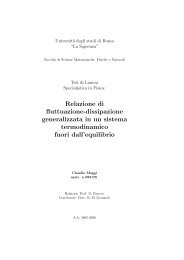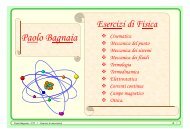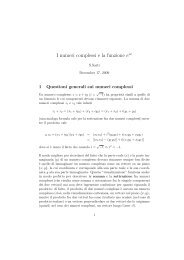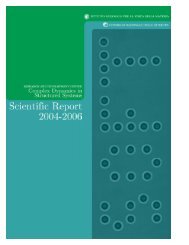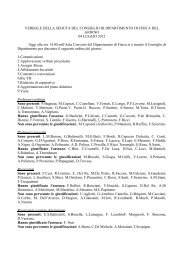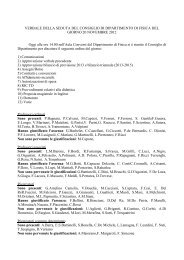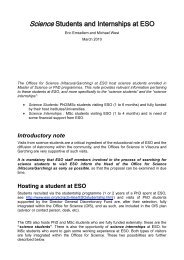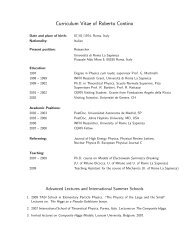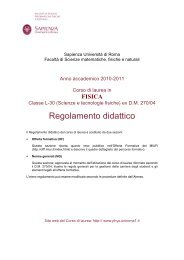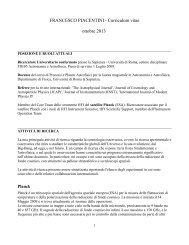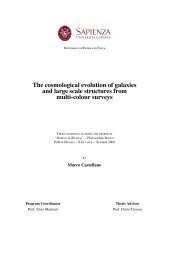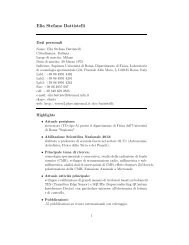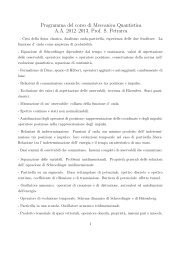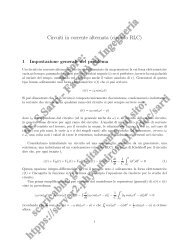download report - Sapienza
download report - Sapienza
download report - Sapienza
Create successful ePaper yourself
Turn your PDF publications into a flip-book with our unique Google optimized e-Paper software.
Scientific Report 2007-2009<br />
History of Physics and Physics Education<br />
History of Physics and Physics Education<br />
Researches in history of physics have been pursued for a long time now in our department.<br />
Beside the direct interest and active role of a figure like Edoardo Amaldi, it is at least since the<br />
late seventies that a group of researchers has been engaged in the field as its main object of study.<br />
In the last decade efforts have been concentrated on the development of Italian physics in late<br />
19th and 20th centuries, revisiting in a new light topics that had been already discussed (mainly<br />
through the protagonists recollections) and opening new vistas on subjects not yet explored by<br />
historians. This is largely due to the circumstance that in past years we have done a great deal of<br />
work locating, collecting, preserving and cataloguing a number of relevant sources, mainly personal<br />
papers of physicists who played a significant role in Italian science (in Rome and elsewhere); so that<br />
at the same time our department can easily claim to be the repository of the largest collection<br />
of primary sources for the history of contemporary Italian physics, and a wealth of previously<br />
unexplored documentation has been made available to researchers. These sources have been duly<br />
used, and a stream of studies has come out as a result, giving a fresh impetus to the reprisal of<br />
attention toward the history of modern physics in Italy (and its connections to the international<br />
context and to close disciplines).<br />
In the last years these studies have been concentrated along three main directions: the transition<br />
from the early study of physics in the Papal university to the institutional development of physics<br />
in Rome after 1870, through the work of the first director of the Physics Institute of the new<br />
University built soon after the unification of the country, Pietro Blaserna [H1]; the role of Edoardo<br />
Amaldi in the years of reconstruction following WWII, both as a scientific leader and institutional<br />
organizer, and as an active researcher in cosmic ray and particle physics [H1]; and the early times<br />
of space science in Italy, from the late fifties to the early seventies, where again institutional<br />
themes are mixed with disciplinary developments, namely as a follow-up of the long standing<br />
Italian tradition in cosmic ray physics [H2]. The last line of research was born out of a wider<br />
international project, sponsored by ESA (European Space Agency), aimed at a full study of the<br />
history of the European effort in space science, in which De Maria and collaborators have been<br />
involved. Battimelli and Ianniello are presently working at bridging the gaps and linking their<br />
respective works and time periods of interest to produce a full history of the development of the<br />
physics school in Rome from the beginnings to the 1960s.<br />
Research in physics education [H3] has for historical reasons a strong tie with studies in the<br />
history of the discipline, since the two fields of research have always been joined in the same<br />
disciplinary group for academic purposes. There is, however, more than just a formal reason<br />
for their proximity: most of the problems discussed at the educational level have their roots<br />
in foundational issues that can in turn be properly treated only if an historical perspective on<br />
the subject is considered. Such is certainly the case for the research topic in which Tarsitani<br />
is engaged: his present involvement in the pedagogical and conceptual problems raised by the<br />
effective teaching of introductory quantum physics stems naturally from his previous interest in<br />
the early history of quantum mechanics, and in the foundational problems connected to that<br />
development. This research is conducted in close collaboration with other groups both in Italy<br />
(Bologna and Udine) and abroad. It should be noted that, in spite of the large literature exisiting<br />
on the teaching of classical physics and relativity, very scarce attention has been paid in the<br />
field of physics education to the pedagogical problems poised by quantum mechanics; this line of<br />
research thus looks so much more promising as it is a field relatively untouched up to very recent<br />
times.<br />
Giovanni Battimelli<br />
<strong>Sapienza</strong> Università di Roma 171 Dipartimento di Fisica



